While Loop¶
Agenda¶
- Intro of Loops
- Print numbers from 1 to 5
- Structure and Syntax of while loop
- Even numbers from 1 to n
- Print multiples of 4
- Print numbers from n to 1
- Find last digit
- Remove last digit
Success
There are a lot of quizzes in this session, please take some time to think about the solution on your own before reading further.....
Ques: Print natural numbers from 1 to 5.
Method 1:
System.out.println(1);
System.out.println(2);
System.out.println(3);
System.out.println(4);
System.out.println(5);
Method 2:
int i = 1;
System.out.println(i);
i ++ ;
System.out.println(i);
i ++ ;
System.out.println(i);
i ++ ;
System.out.println(i);
i ++ ;
System.out.println(i);
Comparison of Method 1 and Method 2:
Both Method 1 and Method 2 output the numbers 1, 2, 3, 4, and 5 in order. The only difference between the two methods is the way the code is written.
- Issues In Method 1 : Since we are updating the values as well along with copy pasting the lines. Possibility of Human Error
- Issues In Method 2 : We are repeating the same lines again and again.
Loops¶
Repeat a task multiple times
- For Loop
- While Loop
- Do while Loop
Method 3:
int i = 1;
while(i <= 5){
SOPln(i);
i = i + 1;
}
| i | i<=5 | Output | i + 1 |
|---|---|---|---|
| 1 | true | 1 | 2 |
| 2 | true | 2 | 3 |
| 3 | true | 3 | 4 |
| 4 | true | 4 | 5 |
| 5 | true | 5 | 6 |
| 6 | false | Break |
Structure of While loop¶
Step 1: Initialization of a loop variable.
Step 2: Write while with condition.
Step 3: Write the task you want to repeat.
Step 4: Updation of loop variable.
Syntax of while loop¶
initialize
while(condition){
// task to be repeated
// updation
}
Flow chart of while loop:
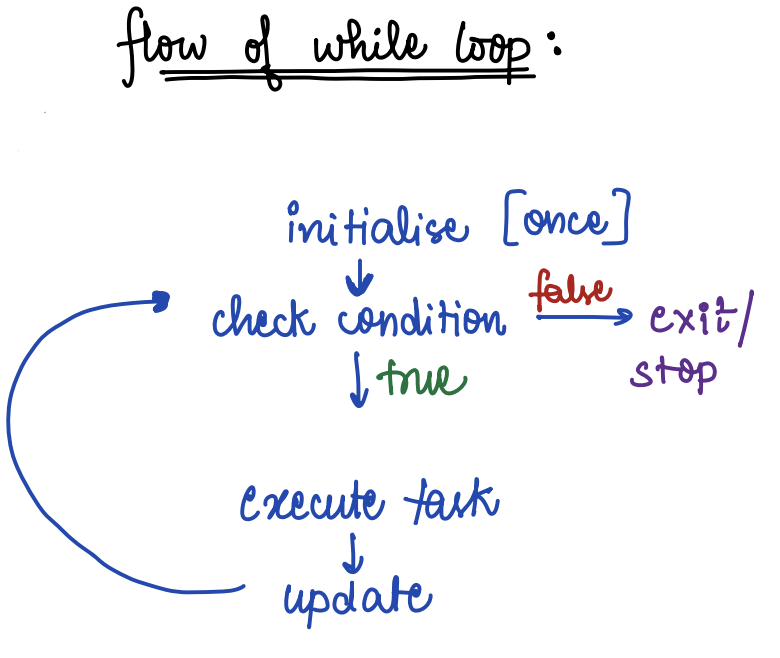
Question¶
What is the output of the following code?
int i = 5;
while(i <= 10){
System.out.println(i);
i = i * 2;
}
Choices¶
- 5
10 - 0
- Error
Question¶
What is the output of the following code?
int i = 1;
while(i < 5){
System.out.print(i + " ");
i = i + 1;
}
Choices¶
- 1 2 3 4 5
- 1 2 3 4
- 5 4 3 2 1
Question¶
What is the output of the following code?
int i = 0;
while(i <= 10){
System.out.print(i + " ");
i++;
}
Choices¶
- 0 1 2 3 4 5 6 7 8 9 10
- 1 2 3 4 5 6 7 8 9 10
- Error
Question¶
What is the output of the following code?
int i = 1;
while(i >= 10){
System.out.print(i + " ");
i = i + 1;
}
Choices¶
- Error
- 1 2 3 4 5 6 7 8 9 10
- Nothing will get printed
- 10 9 8 7 6 5 4 3 2 1
Question¶
What is the output of the following code?
int i = 1;
while(i <= 10){
System.out.print(i + " ");
}
Choices¶
- 1 2 3 4 5 6 7 8 9 10
- 1 1 1 1 1 1 ... Infinite times
Question¶
What is the output of the following code?
int i = 0;
while(i <= 10){
System.out.print(i + " ");
i = i * 2;
}
Choices¶
- 5 10
- 0
- Infinite loop
- 0 2 4
Question¶
What is the output of the following code?
int i = 1;
while(i <= 5){
System.out.print(i + " ");
i = i - 1;
}
Choices¶
- 1 2 3 4 5
- 5 4 3 2 1
- Infinite loop
- Inki pinky ponky
Question¶
How many times Hi will be printed in the output?
int i = 0;
while(i <= 5){
System.out.println("Hi");
i = i + 1;
}
Choices¶
- 5
- 6
- 4
- Infinite times
Question¶
How many times Inki Pinki Ponki will be printed in the output?
int i = 1;
while(i <= n){
System.out.println("Inki Pinki Ponki");
i = i + 1;
}
Choices¶
- n
- (n+1)
- Only once
- Too many times
Ques: Print even numbers from 1 to n
int n = scn.nextInt();
int i = 1;
while(i <= n){
if(i % 2 == 0){
System.out.println(i);
}
i = i + 1;
}
Explain dry run of the above code for more clarity Example of how to dry run the above code:
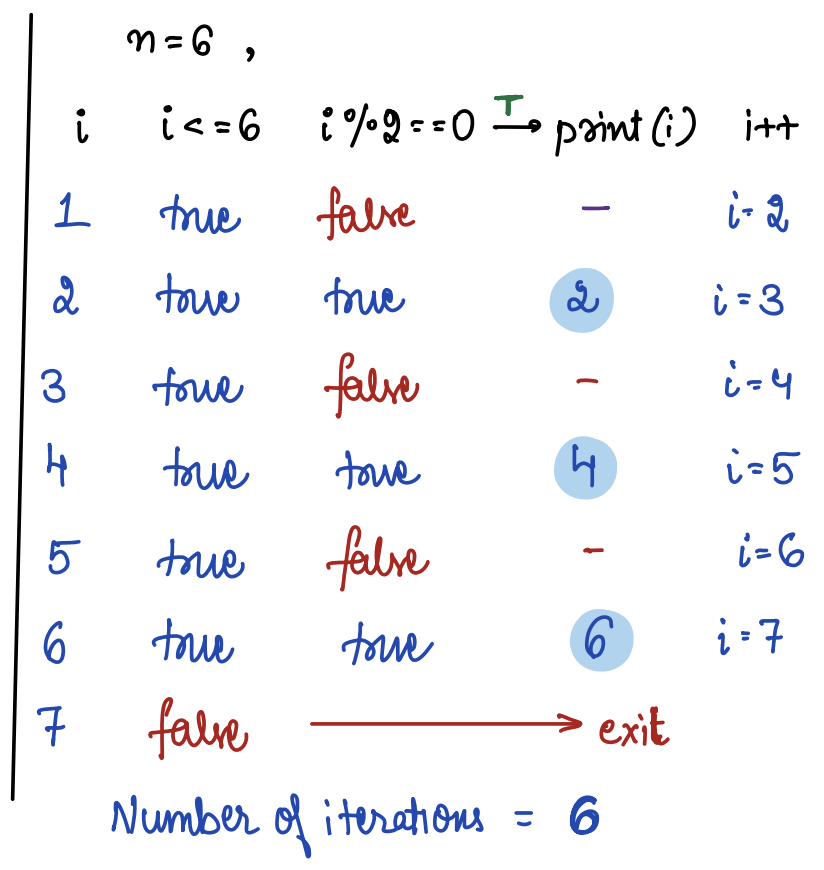
Another way to implement the above task is as follows:
int i = 2;
while(i <= n){
System.out.println(i);
i = i + 2;
}
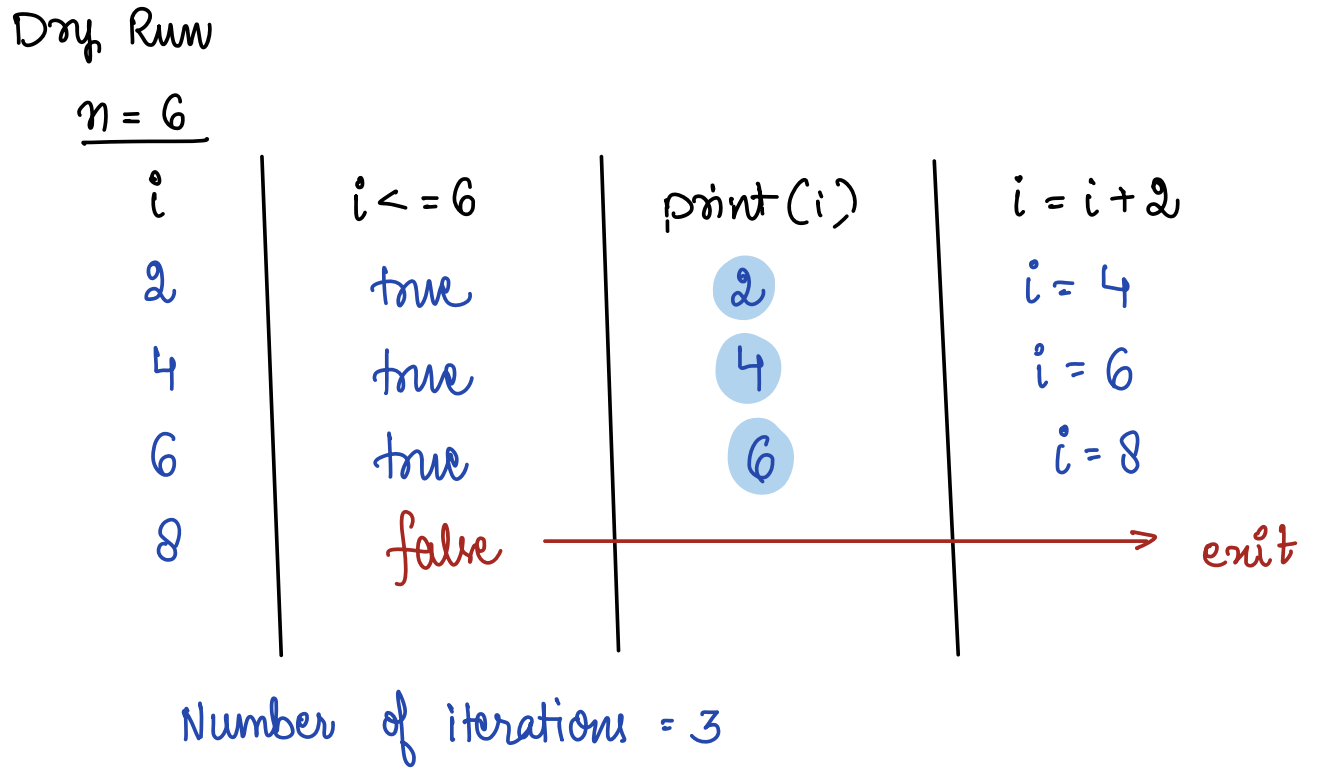
Note that the number of iterations are reduced from 6 to 3.
Let us take some test cases to test our code.
Consider n = 17
The output should be 2 4 6 8 10 12 14 16
Instruction for Instructor: Run the code on editor to verify the same and show to the students.
In the range 1 - 17, the total number of even numbers are 8.
In the range 1 - 10, the total number of even numbers are 5.
Based on the above observation, ask the following question to the students?
How to calculate the total number of multiples of x between 1 and n?
Ans: n/x
Total number of multiples of 2 from 1 to 40 is = 
Total number of multiples of 2 from 1 to 51 is = 
Question¶
What will be the total number of iterations in the following code?
int i = 1;
while(i <= 20){
System.out.println(i);
i = i + 1;
}
Choices¶
- 20
- 10
- 15
- No clue
Question¶
What will be the total number of iterations in the following code?
int i = 2;
while(i <= n){
System.out.println(i);
i = i + 2;
}
Choices¶
- n
- n/2
- n+1
- Infinite
Question¶
What will be the total number of iterations in the following code?
int i = 3;
while(i <= n){
System.out.println(i);
i = i + 3;
}
Choices¶
- n / 3
- 3 * n
- n+3
- n
Question¶
What are all the multiples of 4 between 1 to 18 ?
Choices¶
- 4 8 12 16 20 24
- 4 6 8 10 12 14
- 4 8 12 16
- 1 4 8 12 16
Ques: Print multiples of 4 till n.
Approach 1:
In this approach, the code takes an input from the user and stores it in the variable n. Then, it uses a while loop to iterate from 1 to n. During each iteration, if the value of i is divisible by 4, it prints the value of i using System.out.println().
int n = scn.nextInt();
int i = 1;
while(i <= n){
if(i % 4 == 0){
System.out.println(i);
}
i++;
}
If n is taken as 10, the output of the above code would be: 4 8
Approach 2: Number of instructions executed are reduced
In this approach, the code initializes the variable i to 4 and then uses a while loop to print the value of i$ in each iteration. The value of i is incremented by 4 during each iteration until it becomes greater than n .
Code:
int i = 4;
while(i <= n){
System.out.println(i);
i = i + 4;
}
Explain using dry run as follows:
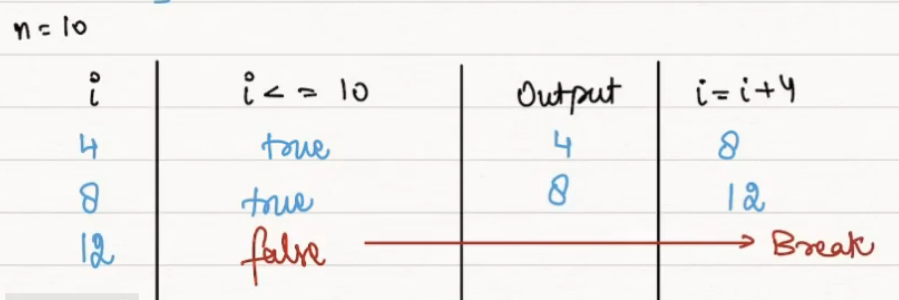
Contrast both the dry runs and stress on the fact that the number of iterations are reduced from 10 to 2.
Question¶
What are the total number of iterations of the following code?
int i = 4;
while(i <= n){
System.out.println(i);
i = i + 4;
}
Choices¶
- n
- n + 4
- n / 4
- Easy Peesy
Ques: Print numbers from n to 1.
int n = 5;
while(i >= 1){
System.out.println(i);
i--;
}
Explain using dry run as follows:
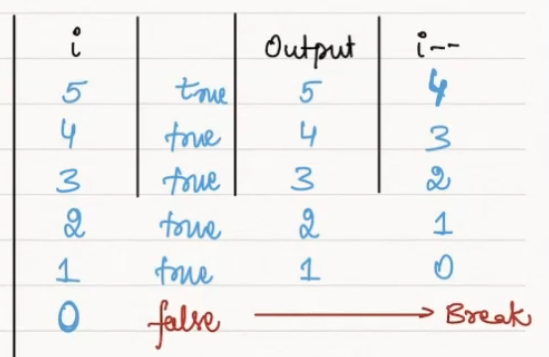
Question¶
Predict the output:
int i = 10;
while(i >= 0){
System.out.print(i + " ");
i = i - 2;
}
Choices¶
- 10 9 8 7 6 5 4 3 2 1 0
- 10 8 6 4 2
- 10 8 6 4 2 0
- 0 2 4 6 8 10
Dry Run:
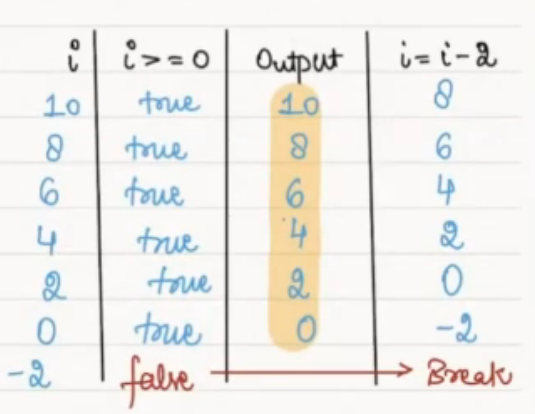
Modulus operator (%)¶
It is used to find the remainder. When we take modulus by 10, we get the last digit of that number.
Question¶
Predict the output of the following code:
int x = 7185;
System.out.println(x % 10);
Choices¶
- 8
- 578
- 718.5
- 5
Question¶
Predict the output of the following code:
int x = 4578;
System.out.println(x % 10);
Choices¶
- 8
- 578
- 78
- None
Question¶
Predict the output of the following code:
int x = 99576;
System.out.println(x % 10);
Choices¶
- 6
- 576
- 995
- None
Question¶
Predict the output of the following code:
int x = 7248;
System.out.println(x / 10);
Choices¶
- 724.8
- 725
- 724
- Inky pinky ponky
Ques: Given a positive integer, write code to find it's last digit.
Code:
int n = scn.nextInt();
System.out.println(n % 10);
Ques: Given a positive integer, write code to remove it's last digit.
Code:
int n = scn.nextInt();
n = n / 10;
System.out.println(n);
